HEDIS (Healthcare Effectiveness Data and Information Set) is a critical quality measurement tool used to assess healthcare performance across various domains. For healthcare organizations, the HEDIS season, which typically spans February to May, requires a proactive approach to ensure data accuracy, compliance, and efficiency. Below are three key steps health systems, hospitals, and physician practices should take to effectively prepare for the upcoming HEDIS season.
Reminder of the audit process:
According to NCQA, the HEDIS compliance audit contains two parts – information system capabilities and HEDIS specification standards.
1. Information System Capabilities: The first part reviews an organization’s overall information systems capabilities for collecting, storing, analyzing, and reporting health information.
2. HEDIS Specifications Standards: The second part addresses the organization’s compliance with HEDIS specifications across several domains, including:
- Effectiveness of Care.
- Access/Availability of Care.
- Experience of Care.
- Utilization and Risk Adjusted Utilization.
- Health Plan Descriptive Information.
- Measures Collected Using Electronic Clinical Data Systems.
HEDIS audits are important for Medicare and Medicaid health plans because data is used to determine the efficacy of a payer to care for its members. HEDIS helps highlight care gaps by identifying areas where patients may not be receiving necessary preventive care or treatments. For Medicare Advantage plans, the HEDIS review process contributes to the Star Rating system, which evaluates plan quality. Providing accurate and timely responses to HEDIS requests can positively impact HEDIS and Star Ratings, thereby enhancing payer and patient satisfaction.
3 Essential Steps for healthcare organizations to prepare for HEDIS Audit Season
1. Understand HEDIS Measures Relevant to Your Organization
HEDIS encompasses over 90 measures covering 6 domains such as preventive care, chronic disease management, and patient satisfaction to name a few. Begin by identifying the specific measures relevant to your organization’s patient population and services. We recommend being proactive as much as possible and reaching out to contracted payers to discuss and prepare for the upcoming HEDIS Review season. Some key areas for discussion should include expected volumes and timeframes. For more resources visit:
- Review the latest NCQA guidelines and updates to HEDIS measures.
- Explore the HEDIS MY 2024 Measure Descriptions Guide.
⚡ MRO TIP: Focus on measures where your organization has historically underperformed and where improvements can be made.
A clear understanding of the measures allows you to prioritize efforts and allocate resources effectively.
2. Plan for Workload and Data Collection
Accurate and timely data submission is the cornerstone of HEDIS success. Many payers utilize electronic data exchange to capture necessary data. To optimize this process:
- Ensure your EHR system is up-to-date and configured to capture HEDIS-relevant data.
- Conduct a data quality audit to identify and address gaps or inconsistencies.
- Work with your IT team to streamline the extraction and submission of data to payers.
- Ensure privacy and security safeguards continue to be maintained.
⚡ MRO TIP: Setting up a fluid reporting process will ensure accuracy and timeliness throughout the HEDIS Review season.
2. Engage and Educate Staff
Clinical and administrative staff play a pivotal role in HEDIS preparation. Educating your team about the importance of HEDIS and how their role in the process helps to achieve desired outcomes. Consider the following:
- Provide training sessions on HEDIS measures and data collection procedures.
⚡ MRO TIP: Check out this HEDIS Training resource from NCQA.
- Emphasize the importance of accurate documentation in patient records.
- Designate a HEDIS coordinator or team to oversee preparation and address staff concerns.
Final Thoughts
HEDIS season can be a demanding and overwhelming time for healthcare organizations, but with advanced strategic planning, health systems, hospitals, and physician practices can achieve success. MRO is here to support healthcare organizations through HEDIS season, offering resources and guidance to ensure data accuracy and compliance. By focusing on data quality, staff education, and fully understanding HEDIS measures, your organization can meet health plan requirements and ultimately enhance the quality of care to your patients.



